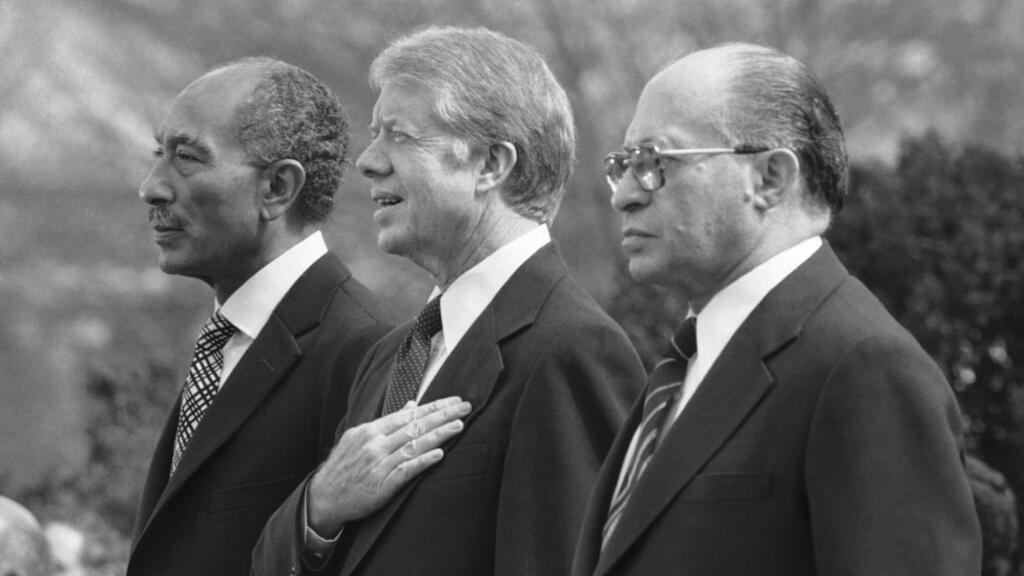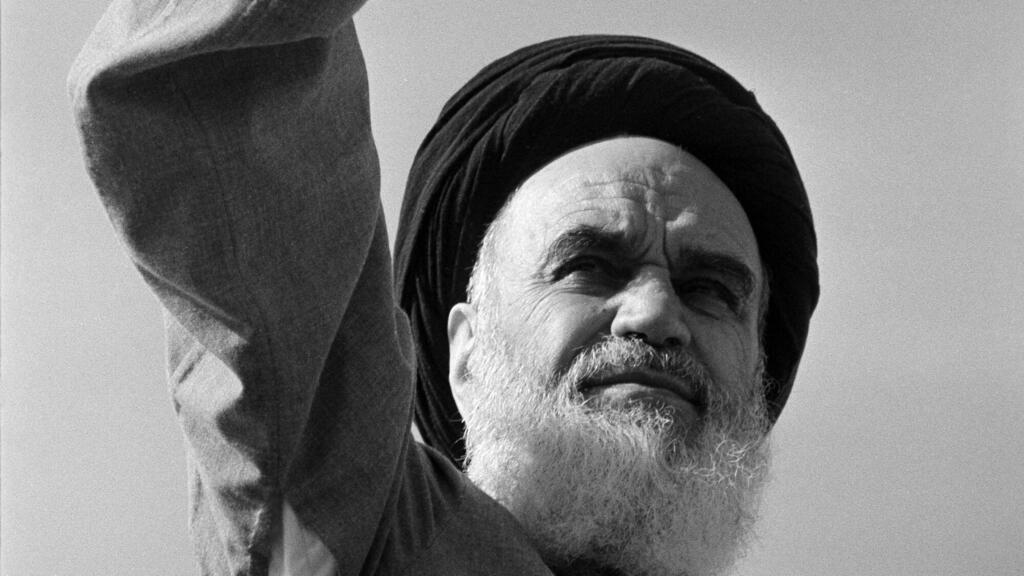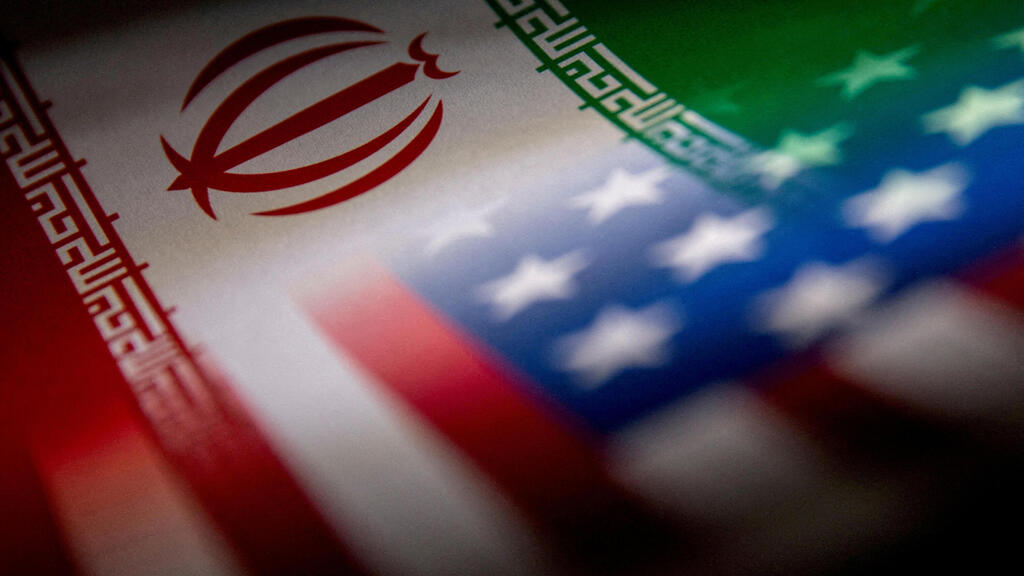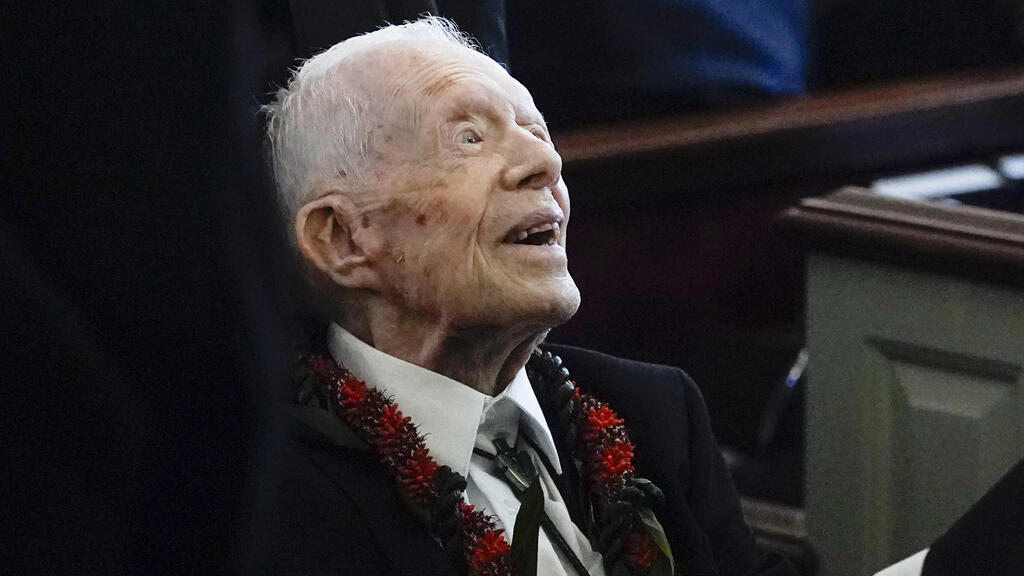Getting your Trinity Audio player ready...
Jimmy Carter, the 39th President of the United States, is remembered for both his remarkable achievements and significant failures in the Middle East. On one hand, his role in the Camp David Accords, which brokered peace between Egypt and Israel, remains a high point in Middle Eastern diplomacy.
On the other hand, his handling of Iran in the late 1970s has been widely criticized, with many arguing that his policies played a pivotal role in the destabilization of the region and the rise of the Islamic Republic.
4 View gallery


Anwar Sadat, Jimmy Carter and Menachem Begin at peace agreement signing between Israel and Egypt
(Photo: AP)
As Carter's recent death at the age of 100 prompted reflections on his legacy, many Iranians and critics of his foreign policy revisited how his actions contributed to the creation of an Iranian regime hostile to the West and a persistent threat to Israel’s security.
Before Carter’s presidency, Iran was one of the United States' most reliable allies in the Middle East. Under the leadership of Shah Mohammad Reza Pahlavi, Iran acted as a stabilizing force, a bulwark against Soviet influence during the Cold War, and a key supporter of Western interests in the region. The Shah’s regime, backed by U.S. military aid and oil resources, was an essential ally in the region, especially for Israel, which benefited from Iran’s counterbalance to hostile Arab states.
However, by the late 1970s, cracks in the Shah’s rule began to emerge. The Iranian people were dissatisfied with his authoritarianism, corruption and the growing economic divide between the elite and the masses. While many were advocating for democratic reforms, an influential faction of radical clerics led by Ayatollah Ruhollah Khomeini advocated for the overthrow of the monarchy and the establishment of an Islamic republic.
Carter, who took office in January 1977, initially maintained support for the Shah, seeing him as a key partner in regional stability. However, Carter’s administration struggled to adapt to the rapidly changing political environment in Iran.
Despite growing unrest and widespread protests against the Shah, Carter continued to publicly refer to Iran as an “island of stability” in the Middle East well into 1978, even as the political crisis deepened.
By the end of 1978, the situation was clearly spiraling out of control. The Shah was increasingly unable to maintain order and Carter’s hesitance in taking decisive action contributed to the regime’s collapse. In January 1979, the Shah was forced into exile, with the U.S. granting him asylum for medical treatment, a controversial move that many saw as a final blow to the monarchy.
At the same time, Carter’s administration failed to recognize the radical nature of Khomeini’s movement. Despite Khomeini’s promises that his government would be moderate and would not threaten American interests, Carter allowed the U.S. military to stand down as the Shah’s regime crumbled, ensuring that Khomeini’s Islamic Republic could rise unchallenged.
Khomeini returned to Iran in February 1979 to a triumphant welcome. Soon after, he became the Supreme Leader of Iran, instituting a theocratic, Islamic government.
For Israel, the Iranian revolution was disastrous. Under the Shah, Iran had been a vital counterweight to Arab hostility. After the revolution, Iran’s new leadership called for the destruction of Israel, with Khomeini famously declaring that "Israel must be wiped off the map."
Iran’s support for Palestinian militant groups, its provision of weapons to Hezbollah and its increasing defiance of U.S. and Israeli diplomatic efforts made Iran one of Israel’s most dangerous adversaries.
In the years following the revolution, Iran’s pursuit of nuclear capabilities became a central concern for Israel. The U.S., under Carter’s successor, Ronald Reagan, failed to contain Iran’s growing influence, and the regime’s ambitions to acquire nuclear weapons continue to shape the region’s geopolitics today.
While Carter’s administration did have successes in the Middle East, most notably the Camp David Accords, his handling of Iran remains a focal point of criticism. Carter’s failure to understand the complexities of the Iranian revolution and his decision to support Khomeini’s rise to power are seen as critical errors that helped destabilize the region.
His policies contributed to the creation of an Iran that not only challenged Western interests but became a major source of instability, supporting terrorism and anti-Israel rhetoric.
Carter’s critics, such as Iranian political analyst Arvin Khoshnood, argue that Carter is responsible for the deaths of hundreds of thousands of Iranians, as the revolution he helped facilitate brought decades of suffering to the Iranian people. Khoshnood claims that Carter’s indirect support for Khomeini allowed a regime to take root that would wreak havoc both within Iran and across the region.
While Carter’s death at 100 has prompted a reevaluation of his legacy, particularly in the U.S., where he is remembered for his role in the Camp David Accords, his policies toward Iran cast a long shadow over his time in office. The rise of the Islamic Republic has had profound and lasting effects, both for Iran and for Israel. Iran’s support for terrorism, its nuclear ambitions, and its antagonism toward Israel are direct consequences of the instability that Carter’s policies helped create.
<< Get the Ynetnews app on your smartphone: Google Play: https://bit.ly/4eJ37pE | Apple App Store: https://bit.ly/3ZL7iNv >>
 Amine Ayoub
Amine AyoubAs we reflect on Carter’s complex legacy, it’s clear that both successes and failures marked his tenure in office. While his achievements in securing peace between Egypt and Israel are undeniable, his handling of Iran remains one of the most significant failures of American foreign policy. The Iranian revolution, and its aftermath, reshaped the Middle East in ways that continue to affect global security.
For Israel, the rise of Iran as a nuclear-capable adversary remains a pressing concern—one that Carter’s policies inadvertently helped create. His death reminds us of the need for nuanced reflection on a leader whose decisions left an indelible mark on the Middle East, for better and for worse.
- Amine Ayoub is a policy analyst and writer based in Morocco and a member of the Middle East Forum think tank.





